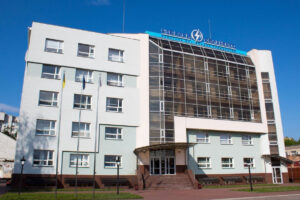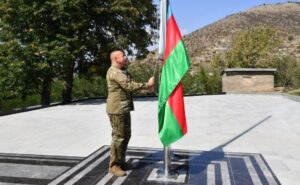
On November 2 and 3, Kyiv will host the 21st Ukrainian CFO Forum, also known as the Ukrainian CFO Forum.
The main theme of the 2023 event is “Strategy and Tools for Business Transformation”. The forum will feature speeches, discussions, on-stage interviews, specialized webinars and workshops, and the event will bring together more than five hundred top managers from all over Ukraine in offline and online formats.
Why should you attend the 21st Ukrainian CFO Forum?
During the forum, more than 40 speakers – CFOs of leading international and Ukrainian companies – will help define a strategic plan for aligning resources with priorities and critical areas of development, and share their own experience on how businesses can use new tools and transformation strategies for agility and growth.
Key topics for discussion:
The forum will be held with the support of international companies Payoneer, Pivdenny Bank, KPMG in Ukraine, Boyden, Asters, Arzinger, Vchasno, Innoware, EY Ukraine, ACCA and other. partners.
For security reasons, the venue is not announced. The FA Service team is preparing an offline event and an online broadcast for those who are unable to attend the forum live.
More information about the program, speakers and partners of the forum is available on the website: https://cfo.ua/ukr/xxi_cfo_forum-2023.
Interfax readers have special participation conditions until October 25. With the promo code BraveInterfax20, you will receive -20% off all participation packages. Join in teams and invite your colleagues to divide the focus areas and ask questions to the speakers: https://cfo.ua/ukr/xxi_cfo_forum-2023#tickets

On the market of cottage towns in Kiev in September 2023 there are 97 objects, which is 11 more than a year earlier, said the director of consulting company “RealExpo” Victor Kovalenko.
“In the market of cottage construction in Kiev during the year appeared 11 new projects: one town in Goloseevsky, Dniprovsky, Obolonsky and Svyatoshinsky districts. Two new projects appeared in Darnytskyi and Desnyanskyi districts. Three new towns appeared in Solomensky district”, – Kovalenko is quoted in the research of “RealExpo”, published on the portal zagorodna.com.
Thus, in Solomenskyi district there are 27 cottage towns, in Goloseevskyi – 20, in Darnitskyi – 17, in Svyatoshynskyi – nine, in Desnyanskyi – eight, in the rest – five or less.
Townhouses (69%), cottages (30.9%), duplexes (11.3%) prevail in the structure of real estate types in cottage towns of the capital. The share of quadrohouses is only 2%.
According to Kovalenko, prices for cottage towns decreased by 7.8% compared to last year, to 53.8 thousand UAH/sq. m. The highest prices are offered in Podilsky district (86.3 thousand UAH/sq. m), Goloseevsky district (77 thousand UAH/sq. m) and in Svyatoshinsky district (50.7 thousand UAH/sq. m).
According to the company’s data, in September of this year construction of 24 townships is underway, while the number of completed townships is 65, eight are at the project stage. 41 cottage towns in Kyiv have been fully built and sold.
During the year the construction of nine cottage towns was completed, construction work has started on two. At the same time, construction has been suspended in 10 cottage towns.

A two-day conference in Lviv kicked off the open enrollment of participants in the three-year international cultural project “UREHERIT. Architects for Heritage in Ukraine: Recreating Identity and Memory”.
“During the conference in Lviv, we launched the open enrollment of the project participants. We are waiting for applications from Ukrainian professionals and communities about their willingness to work in one or another working group”, – said the initiator and coordinator of the project, member of the Board of the Lithuanian Association of Architects Rūta Leitanaitė (Rūta Leitanaitė).
The aim of the three-year UREHERIT project is to explore various topics related to the preservation and restoration of cultural heritage.
“Heritage is a catalyst for the future for any country, and even more so for Ukraine, which is now really looking for restoration to rediscover and recreate its image and vision of the future,” said UNESCO coordinator Chiara Dezzi Bardeschi at the opening of the conference.
Acting Minister of Culture and Information Policy Rostislav Karandeev emphasized that coordination and interaction with the international community is a key factor for Ukraine in building solutions and developing algorithms for damage assessment, as well as restoration and preservation of cultural heritage.
Chairwoman of the State Agency for Tourism Development Maryana Oleskiv is convinced that the issue of incentives for heritage preservation is extremely important, so that it would be economically profitable for the owner to restore the monument. “Tourism is one of the ways that the heritage for the owner was not a yarmulke, but a commercially successful project. For our part, we are thinking, for example, of upgrading the category of a hotel that has carried out a full restoration of a historic building,” Oleskiw reported.
“We see cultural heritage not only as something we must preserve, but also as a resource for sustainable and democratic reconstruction of Ukraine, cities and the country itself – economically, environmentally and culturally. Heritage brings communities together, gives a sense of place and pride to a nation, and will help bring people back home,” Leitanaite said.
According to Ruth Schagemann, president of the Architects’ Council of Europe (ACE), policy makers need to recognize the value of all heritage, not just monuments with protected status. As for the European experience, “good public procurement, good competition, transparent processes, participation of people, local society, and adaptation of rules” can help Ukrainians to preserve architectural heritage.
Among the main topics of UREHERIT are assessment of war damage to cultural heritage; criteria and methodologies for assessing the value of heritage; public participation in the restoration of cultural heritage; architectural competitions; integrated renovation of modernist housing; technologies and innovations in restoration projects, etc.
At this stage of the project the existing situation and needs of Ukraine as a whole and individual cities are being assessed. The results of the analysis and a detailed plan for the directions will be presented at the next conference, in Stockholm in May 2024.
The conference in Lviv was attended by more than 300 professionals, during which the first developments, program concepts and even investment projects were presented.
Oleksandr Chyzhevskyi, President of the NCAU, emphasized that it is extremely important to introduce the importance of cultural heritage into the broader consciousness. He sees the implementation of the project’s developments in professional education as a key task.
Two educational programs are already underway – for students and graduate architects. For students, an educational program on the revival of cultural heritage as a resource for sustainable transformation will be developed by the Kharkiv School of Architecture (KSAU), while advanced training programs for professionals are being developed by the NSAU and Swedish architects.
As reported, the international cultural project “UREHERIT. Architects for Heritage in Ukraine: Recreating Identity and Memory” was initiated by the Lithuanian Association of Architects. It is co-financed by the European Union’s EUR 1 million Creative Europe program (project code 101121502 – U-RE-HERIT) and is implemented by a consortium of 11 professional organizations from nine countries.

The cost of construction and installation work in Ukraine has increased by 35% since the beginning of 2023 amid a shortage of personnel that has reached 40% in some companies, Oleksandr Nasikovsky, managing partner of DIM Group, told Interfax-Ukraine.
“There is a real shortage of highly qualified personnel. Today, there is an acute shortage of monolithic workers, crane operators, painters, and electricians. In some markets, the shortage in companies reaches 40%, which significantly affects the industry. Since the beginning of the year, the cost of construction and installation work has already increased by more than 35%, which is due to both inflation and a shortage of personnel. I think we will see growth of at least 5-7% in this category by the end of the year,” he said.
Nasikovsky emphasized that the availability of labor and skilled personnel is critical for the recovery of Ukraine, where more than 170,000 residential buildings, 19 airports, approximately 130 railway stations, 3,400 educational institutions and other facilities have been damaged or destroyed. Ukraine is facing an important challenge to ensure the availability of skilled construction workers to rebuild and develop the country, and this requires decisive action and support at all levels.
“We really need a system of motivation at the state level that would encourage young people to study for production specialties and support those who choose the construction industry for professional realization. It could be social incentive systems (social mortgage programs, for example) or additional financial incentives,” Nasikovsky said.
DIM Group was founded in 2014 and consists of six companies covering all stages of construction. To date, it has commissioned 12 buildings in six residential complexes with a total residential area of over 218 thousand square meters. Six residential complexes of “comfort+” and “business class” categories are under construction: “New Autograph, Metropolis, Park Lake City, Lucky Land, etc.

On October 17, the Supreme Court of Ukraine will consider the cassation appeal of PJSC Cherkasyoblenergo in the case of illegal alienation of Steblivska and Korsun-Shevchenkivska HPPs from the company’s ownership.
“In February 2023 the Economic court of Cherkassy region the purchase and sale agreements of these HPPs were recognized invalid, however, already in April the Northern economic court of appeal by its ruling canceled the decision to return these HPPs to the state”, – stated in the press release of “Cherkasyoblenergo” on Monday.
As reported, the Economic court of Cherkassy region by the decision of February 20, 2023 satisfied the claim of “Cherkasyoblenergo” on the invalidation of the purchase and sale agreements of Steblevskaya and Korsun-Shevchenkovskaya HPPs between the company and foreign economic association (FEA) “Novosvit” in 2015.
“Property complexes of Steblivska HPP and Korsun-Shevchenkivska HPP were alienated under the disputed contracts without holding an auction, without notifying the State Property Fund of Ukraine in order to conceal illegal transactions, as a result of which Cherkasyoblenergo and the state suffered significant damage”, – said in the court decision.
As follows from the document, the assessment of the property alienated under the disputed contracts to determine its market value in violation of the requirements of the law “On Joint Stock Companies” and the charter of “Cherkassyoblenergo” was carried out without the decision of the Supervisory Board of the company to engage a subject of appraisal activity, as well as the approval of the market value of the property.
“As a result of illegal assessment of the property of Steblevskaya HPP and Korsun-Shevchenkovskaya HPP as integral property complexes, acting chairman of the company’s management board Kuzminskaya S.A., who concluded the disputed contracts on behalf of Cherkassyoblenergo, artificially underestimated the market value of these two HPPs in order to avoid the prohibition provided for by the charter of PJSC on her independent decision to make transactions on property, the market value of which exceeds 5% of the value of the company’s assets,” the court stated.
According to the lawyer of Tsypin & Partners Marina Sutkovych, who represented Cherkasyoblenergo in court, the total amount of losses of the company as a result of the sale and purchase of two HPPs amounted to UAH 139.5 million.
“However, already on April 11, the Northern Economic Court of Appeal overturned the decision of the court of first instance. The court of appeal refused to satisfy the claim of Cherkasyoblenergo because, in its opinion, Kuzminskaya S.A. did not exceed the powers granted to her by the charter, the transactions were not significant, and other arguments of the court of first instance are unfounded”, – stated in the press release.
However, as noted by Sutkovich quoted in the document, the case file lacks an independent, free from the influence of the parties, judicial appraisal and construction expertise, and the court refused to appoint it for unclear reasons.
“The Northern Economic Court of Appeal was one-sided and took into account mainly the evidence of VEA Novosvit, which violated the principle of equality and due to which the circumstances of the case were not established fully and comprehensively”, – argues the lawyer.
At the beginning of 2022, 46% of shares of PJSC Cherkasyoblenergo were transferred from the State Property Fund to the Ministry of Energy. Another 25% of shares are under the management of PJSC Ukrainian Energy Saving Service Company (UkrESCO).

After Azerbaijan established control over the former Nagorno-Karabakh, the Transcaucasus region entered a new era, where the political and economic prospects of the countries of the region became a subject of discussion in the international arena. In light of this, experts from various countries are analyzing the current situation and trying to predict the future of relations between the countries in the region. A new video published on the YouTube channel “Experts club” was devoted to this very topic, in which Azerbaijani military analyst, leading expert of the analytical center “STEM” Agil Rustamzadeh and the founder of the Kiev analytical center “Experts club”, candidate of economic sciences Maxim Urakin shared their opinion on the situation.
Military-political aspect
The experts emphasize the importance of the reached mutual understanding on the Karabakh issue.
“The resolution of the conflict has created a basis for the resumption of diplomatic dialog and economic cooperation between the countries of the Transcaucasus. Azerbaijan’s confrontation with Armenia is conditioned not only by the Karabakh conflict, the point is that those people who created this geopolitical paradigm were engaged in shaping the worldview of the Armenian population. A part of the Armenian population still believes that they once had a state that included the territories of Azerbaijan, Turkey and Georgia. With the emergence of Western institutions and the change of Armenians’ views, they begin to realize that enmity with such a geopolitical player as Turkey is a dead-end way of the country’s development. It is a way to nowhere, especially when these countries have no territorial claims to you, but you have territorial claims to your neighbors,” Rustamzadeh stressed.
The expert also notes that the signing of a possible peace treaty will give Armenia an impetus to move to a new level of development, will allow it to become not an object but a subject of international politics.
“I meet such an opinion both in Azerbaijan and Turkish colleagues. It is that under certain changes Turkey and Azerbaijan can become the guarantor of Armenia’s territorial integrity. Therefore, I believe that with the pragmatism shown by the Armenian people, the government and the political elite of Armenia, Armenia has chances to become a pro-Western democratic country,” Rustamzadeh said.
In his opinion, in order to ensure long-term stability, it is necessary to analyze all aspects of the conflict and its consequences for regional security.
Economic aspect
Maxim Urakin emphasized the economic sphere of relations between the countries of the region.
“Economy and politics are closely linked, and trade relations between the countries of the Transcaucasus play an important role in shaping the political landscape of the region,” Urakin noted.
The expert also drew attention to how export destinations affect the countries’ political preferences.
“Most of Azerbaijan and Iran’s exports are directed to Europe and Asia, while Turkey’s exports are much more diversified,” the economist emphasized.
Urakin also analyzed each country’s exports and their trade relations in detail, emphasizing the interconnectedness of economic and political factors in the region.
Development Prospects
Rustamzadeh and Urakin agree that further sustainable development of the region requires further work to resolve the remaining conflict situations and increase economic cooperation between the countries.
“Restoring trust and strengthening economic ties between the countries of the Transcaucasus will contribute to the creation of a favorable climate for investment and growth of the regional economy,” Rustamzadeh concluded.
You can learn more about the prospects of development of the Transcaucasus after the end of the Karabakh conflict from the video on the Experts club channel at the link:
Subscribe to the channel here:
ARMENIA, AZERBAIJAN, CAUCASUS, KARABAKH, NAGORNY_KARABAKH, RUSTAMZADEH, URAKIN, WAR